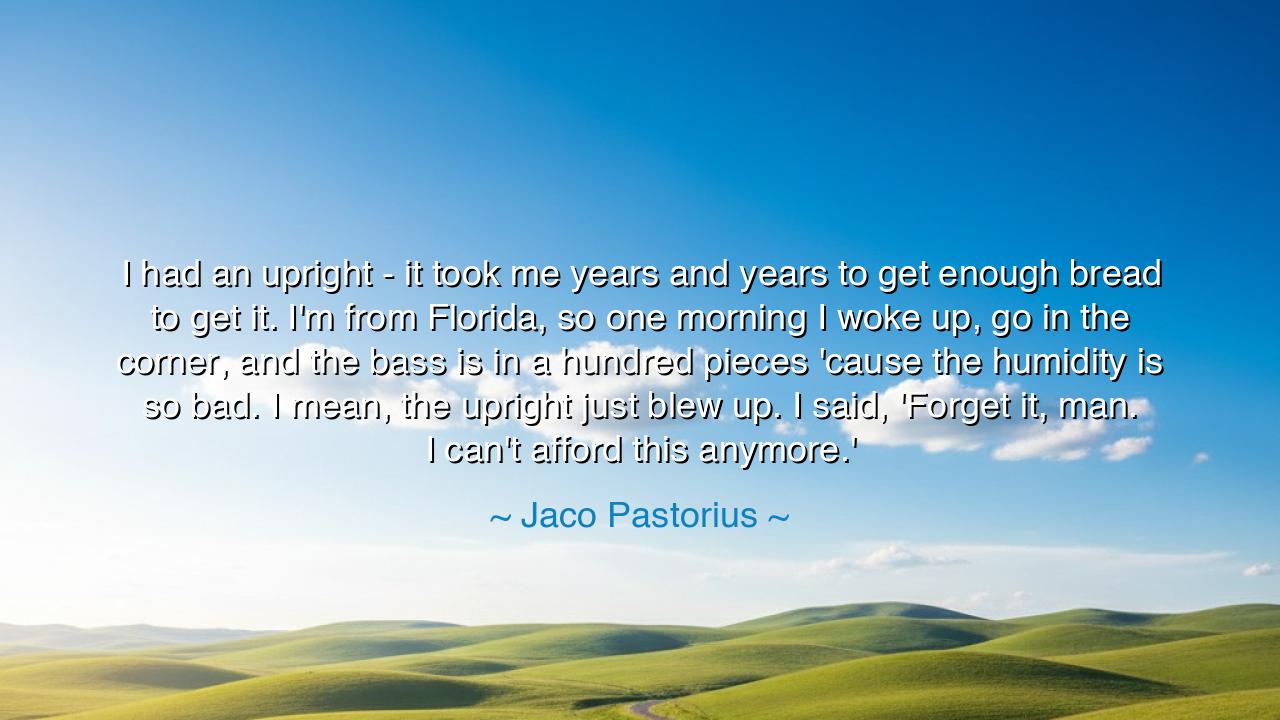
I had an upright - it took me years and years to get enough
I had an upright - it took me years and years to get enough bread to get it. I'm from Florida, so one morning I woke up, go in the corner, and the bass is in a hundred pieces 'cause the humidity is so bad. I mean, the upright just blew up. I said, 'Forget it, man. I can't afford this anymore.'






The words of Jaco Pastorius—“I had an upright—it took me years and years to get enough bread to get it. I’m from Florida, so one morning I woke up, go in the corner, and the bass is in a hundred pieces ‘cause the humidity is so bad. I mean, the upright just blew up. I said, ‘Forget it, man. I can’t afford this anymore.’”—are not merely the lament of a musician; they are the cry of a soul who wrestled with fate and turned loss into transformation. Beneath the surface of this story lies the eternal struggle between man’s labor and the forces that break what he has built.
The upright bass, heavy and noble, had been the fruit of years of toil. Pastorius calls it his prize, bought with bread, with the sweat and sacrifice of countless nights spent laboring. Yet in a single dawn, he found his treasure reduced to ruin, the wood split and broken by the merciless humidity of his homeland. It is a picture of life’s cruel irony: what takes years to create can vanish in a moment. The ancients would call this the hand of Fortuna, the turning wheel that lifts men up only to cast them down.
But Jaco was not destroyed by this loss. He did not lay down his craft in despair. Instead, from the ashes of the upright bass, he turned to the electric bass and remade the world of music. Out of destruction came creation, out of ruin came reinvention. This is the hidden wisdom of his tale: the gods may strip us of what we cling to, not to end our journey, but to force us into paths unimagined.
Consider the story of Thomas Edison, whose laboratory burned to the ground in 1914. When the flames consumed his life’s work, he did not weep. He said to his son, “Go get your mother and all her friends. They’ll never see a fire like this again.” Within weeks he was rebuilding, and from the ashes rose even greater inventions. Like Jaco’s shattered bass, Edison’s fire became not an end but a beginning.
The lesson is carved deeply: that which is broken need not break us. We must learn to see in catastrophe the seed of transformation. When the instrument of your dream splinters in your hands, it may be the universe’s way of calling you to a new instrument, a new voice, a new destiny. The humidity that destroyed Jaco’s upright gave birth, in a sense, to the electric bass lines that would define a generation and inspire countless players after him.
Therefore, let us not curse the day of loss, but look within it for hidden possibility. When what you built with your own hands lies in fragments, ask not only, “Why me?” but also, “What now may I create?” For the broken wood may yet become the fire that warms others, and the end of one dream may become the forge of another.
In practice, take this wisdom and apply it: when your labor collapses—whether it be a business ruined, a relationship broken, or a plan thwarted—do not cling to the shards. Grieve, yes, but then turn your eyes to what new thing might rise. Seek not merely to restore what was lost, but to invent what has never been. For like Pastorius, who became immortal through electric sound, you too may find that what perished was not your end, but your beginning.
Thus, the story of the upright bass is more than a musician’s tale—it is a parable of life itself. What is broken in the corner of your room today may one day echo across the ages, if only you dare to see beyond the ruins and seize the new path hidden within them.






AAdministratorAdministrator
Welcome, honored guests. Please leave a comment, we will respond soon